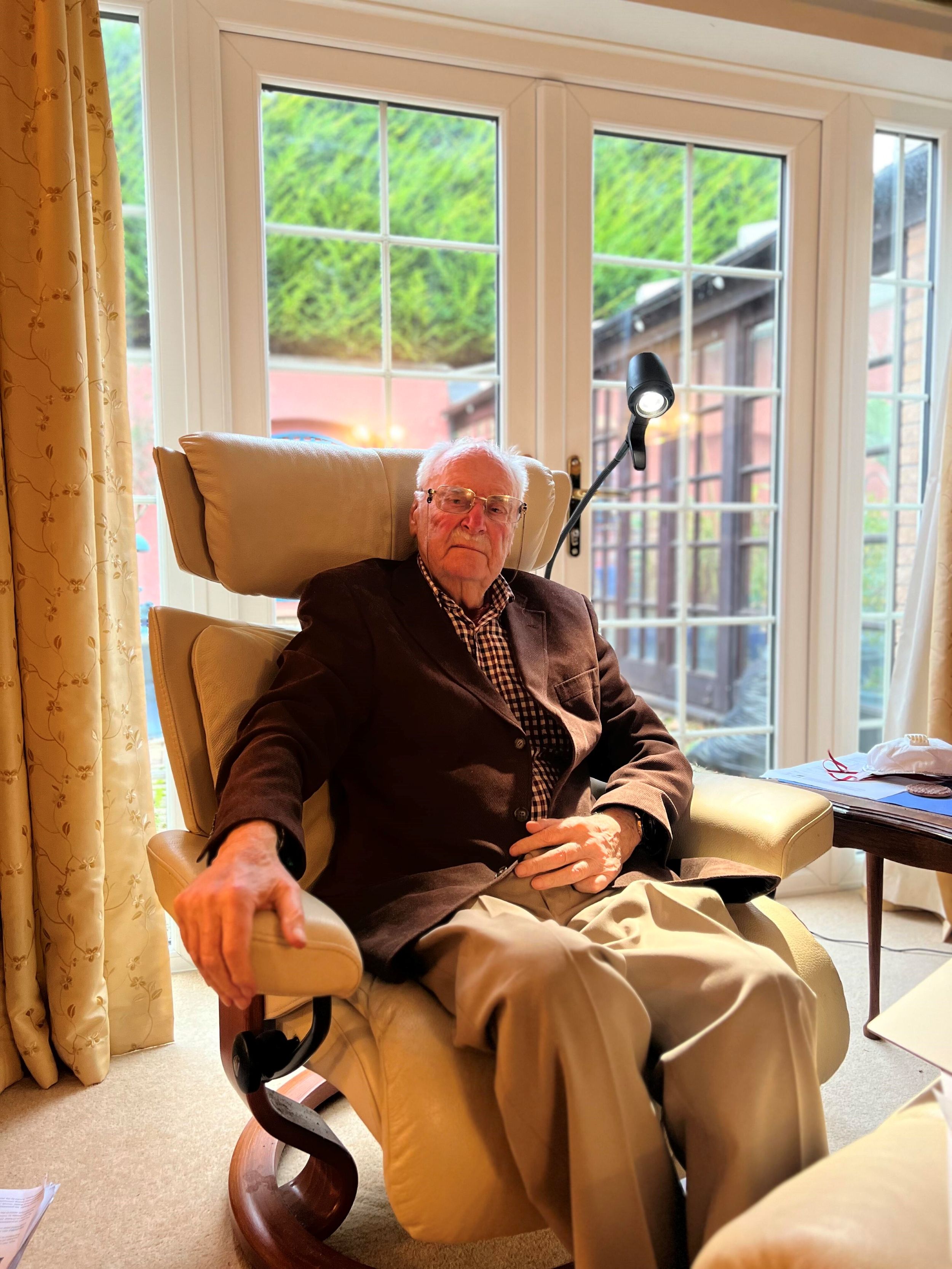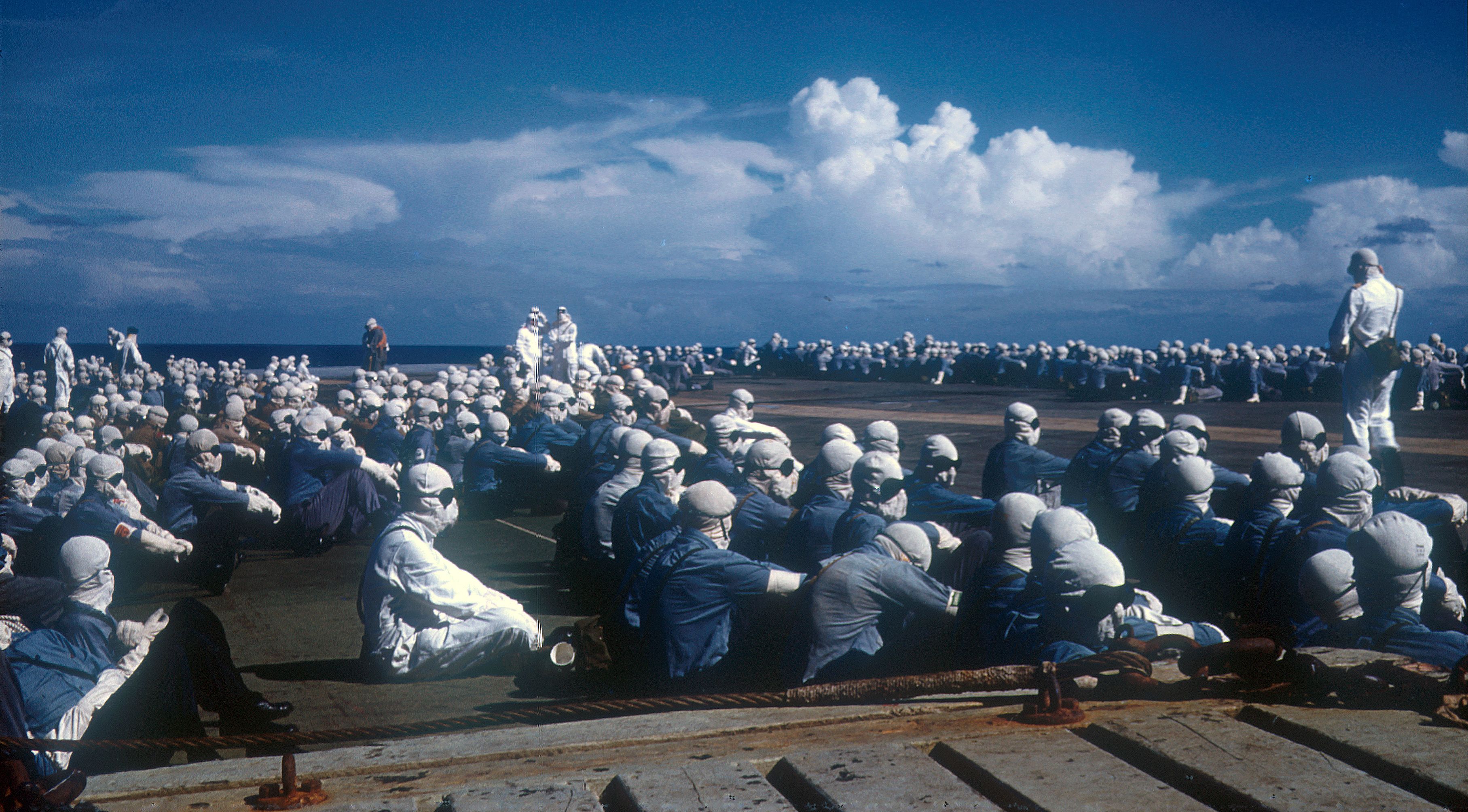
Pete Peters was born in Ipswich in 1931. Peters’s father fought in the Second World War and passed away when Peters was young. Since childhood Peters has been obsessed with flying and he ardently pursued a career in the Royal Air Force (RAF). He graduated from flying school in 1951 and progressed to flying Canberra aircraft. While flying Canberras he was posted to Germany and took part in the sampling of radioactive debris. Following this, he was sent to assist in the sampling of American nuclear weapons for the Castle series on the Marshall Islands. During this series, Peters was required to fly through nuclear clouds in order to gather readings. After assisting in the American tests, Peters became a member of the V-Force and eventually became an instructor. Peters left the RAF in 1985 and worked for Marshall of Cambridge for a number of years. In his later life, Peters has suffered significant respiratory problems. He wonders whether these could be related to his service flying sampling planes. Peters has received compensation through the USA’s RECA (Radiation Exposure Compensation Act) scheme due to his participation in American tests. He now lives in Lakenheath, Suffolk.
Interview extracts
Description
In this clip the interviewer asks Pete Peters how much he knew about his mission in advance. The mission being discussed is Operation Bagpipes, a British operation on an American test series. The location was the Marshall Islands in the Pacific. Bagpipes was fraught with difficulties. Two of the British Canberra aircraft were lost in the vastness of the Pacific. Another crash-landed in Canada on the return flight to the UK, its radioactive cargo still on board.
This is a short extract from an in-depth interview. Pete Peters was recorded for the Oral History of British Nuclear Test Veterans project in 2023. The interviewer was Christopher R Hill. The project was run in partnership with National Life Stories and the full interview can be accessed at the British Library.
Transcript
Were you fully aware of everything that you were doing, I mean, or did you have to wait to get to the Marshall Islands and you were briefed there, or did you know as you were setting off on this particular mission?
Well, there was so little for anybody to tell us, or teach us, because nobody knew damn all about it, or very little about it, apart from the nuclear physicists themselves. So basically, there was a little suck it and see. It’s a job, go and do it. So that’s what we did, that’s the way we approached it, to begin with. With some trepidation, yes, because it was new and unknown. Frightening? To a degree. Also a lot of curiosity in there. This was new, you know, not been done before. So there was a combination of feelings in it. Trepidation and anticipation.
[ends at 0:00:53]
Description
Pete Peters was a Royal Air Force squadron leader who later went on to work in ‘psyops’ and military intelligence. His interview differs somewhat from others in this collection, since Peters did not take part in one of the strictly ‘British’ test operations in Australia or the Pacific. By contrast, he played a vital role in the reconnaissance of American and Russian nuclear tests. In this clip, he talks about the fate of his fellow comrades in Operation Bagpipes, where British pilots took samples from American nuclear tests in Operation Castle. One of these tests was Castle Bravo, one of the most powerful nuclear weapons ever tested.
The prevalence of cancers among Peters’s comrades provides an indication of the risk involved in these cloud-sampling missions. This interview marked a first step in changing the eligibility criteria so that veterans like Peters can receive a Nuclear Test Medal from the UK government.
This is a short extract from an in-depth interview. Pete Peters was recorded for the Oral History of British Nuclear Test Veterans project in 2023. The interviewer was Christopher R Hill. This project was run in partnership with National Life Stories and the full interview can be accessed at the British Library.
Transcript
And of course the aircraft themselves were festooned with filters, on the wingtips, under the fuselage, one on top of the fuselage, and so on and so forth. So they were much modified for the job. And we were, for going through this sort of thing, the air conditioning system was modified so that we were safeguarded, or so it said, but since then all those who took part in this exercise died early, or died after they’d all left the service, in their later life, etc., all of them from cancer. I got cancer, I was lucky in that my wife, bless her soul, picked it up early, wouldn’t listen to me that it was something else, and insisted that the doctor has me into hospital, whipped my cancer out, which is why I’m still here. But yeah, everybody else died of cancer.
[ends at 0:01:06]
Description
Pete Peters took part in the Castle series of American nuclear tests on the Marshall Islands on behalf of the RAF. He talks about the historic lack of recognition for nuclear test veterans in the context of awards received by pilots and navigators. He mentions losing two crews on the way out – this is a reference to the two British Canberra aircraft that were lost over the Pacific on the way to the Marshall Islands.
The image illustrating this clip is an article by Susie Boniface for the Sunday Mirror. Susie’s support and groundbreaking investigative journalism has been invaluable to the test veteran community.
This is a short extract from an in-depth interview. Pete Peters was recorded for the Oral History of British Nuclear Test Veterans project in 2023. The interviewer was Christopher R Hill. This project was run in partnership with National Life Stories and the full interview can be accessed at the British Library.
Transcript
As it was, you know we lost two crews on the way out, they are nothing but remembered. Of the three crews, that’s Flying Officer Warren, Flying Officer Crompton [sp?] and me, Flying Officer Peters, the pilots concerned all got Air Force Crosses, afterwards, about a year or so after, after we were back. The navigators got Queen’s Commendations, but not- they wear a medal for that. But there was a lot of dissention that the navs should also have got AFCs, because they shared the same risks with us, all of them. If anything had gone wrong nastily it would have happened to them just as much as it might have happened to us. So there was a lot of dissension about that afterwards, but that is the service system, and being inured to it, we accepted it.
[ends at 0:00:56]


